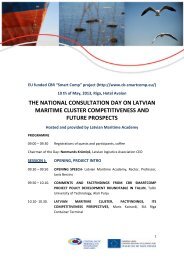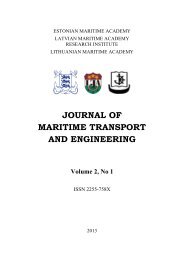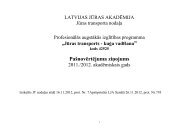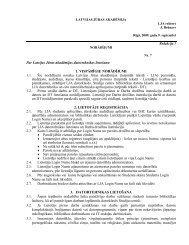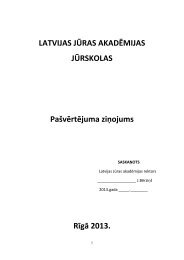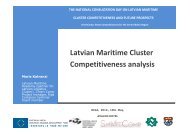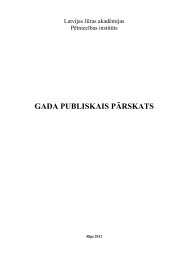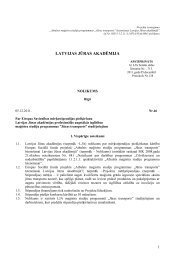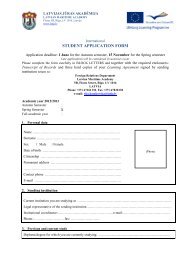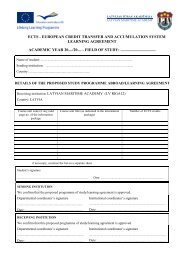14. starptautiskÄ konference 2012 - Latvijas JÅ«ras akadÄmija
14. starptautiskÄ konference 2012 - Latvijas JÅ«ras akadÄmija
14. starptautiskÄ konference 2012 - Latvijas JÅ«ras akadÄmija
Create successful ePaper yourself
Turn your PDF publications into a flip-book with our unique Google optimized e-Paper software.
Proceedings of 14th International conference „Maritime Transport and Infrastructure - <strong>2012</strong>”convoke, convocation, vocation, avocation, voice, vocal, revoke, revocation, revocable, irrevocable,convocator, advocate, advocate, advocation, provocation, etc.5. Prefixes and suffixes of foreign originThe contact of English with various foreign languages has led to the adoption of countlessforeign words. In the process, many derivative morphemes have also been introduced, suffixes as wellas prefixes. As a consequence, there are many hybrid types of compounds in English. The majority offoreign suffixes owe their existence to the reinterpretation of loans. When a word of foreign extractioncomes to be analysed as a compound, it may acquire derivative force. From landscape (which is Dulandschap) resulted scape which is almost entirely used as the second element in compounds, as inseascape, moonscape, skyscape, waterscape, etc.Prefixes of foreign origin came into the English language ready made, due to syntagmaticloans from other languages: when a number of analysable foreign words of the same structure hadbeen introduced into the language, the pattern could be extended to new formations. [5]There are many prefixes, chiefly used in learned words or in scientific terminology, whichhave come into the language through borrowing from Modern Latin, as ante-, extra-, intra-, meta-,para-, etc. A limited number of Latin prepositions can help build hundreds of new vocabulary wordsThe Latin prefix ab- means away from [1]. It connotes motion from, and occurs in English words suchas absent, abstract, abstemious and abhorrent. On the contrary, ad- means to or toward. The -d- oftenattracts to the consonant of the word it is fixed to, doubling the consonant.A basic knowledge of suffixes can increase vocabulary for the student of English. Anunderstanding of just one common ending can have a significant effect on student performance inreading and writing e.g. Latin –fy to make or to become. The older English verbs in –fy are adoptionsof Fr. Verbs in –fier, which are either adapted from Latin verbs or formed on the analogy of verbs. [1]To magnify is to make bigger. To reify is to make into a king. To fortify is to make stronger.Greek –logy (reason, word, speech, and thought). In Greek, logo means word [1]. While it isthe root of English words such eulogy, logical, and prologue, as a suffix -logo helps create hundreds,even thousands, of English derivatives, e.g. logogracy, logogram, logograph, logometer, logonomy,logopedia, logotype, etc.6. The Role of IntercomprehensionThe big problem of comprehension and intercomprehension involves recognizing languageboth grammatically and semantically. The process of understanding involves understanding thesituation as well, and this relates the understanding of language to understanding the world.The vocabulary of the sciences and other specialized studies consists of words or otherlinguistic forms current in several Romance languages and differing from Latin in being adapted to thestructure of the individual languages in which they appear.The common Latin roots facilitate understanding cognate words in other Romance languagesfor students of all levels of ability and experience. The truth is, Latin roots are alive and strong notonly in language teaching courses around the world, but also in our own daily intercourse. Latin wordsare used every day in most European languages. The following table shows a number of words ofmaritime vocabulary in English and several Romance languages where the common Latin rootscontribute to understanding and intercomprehension.110



